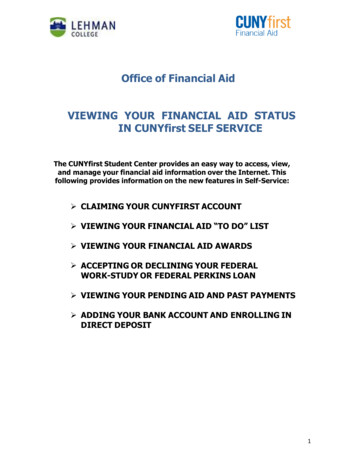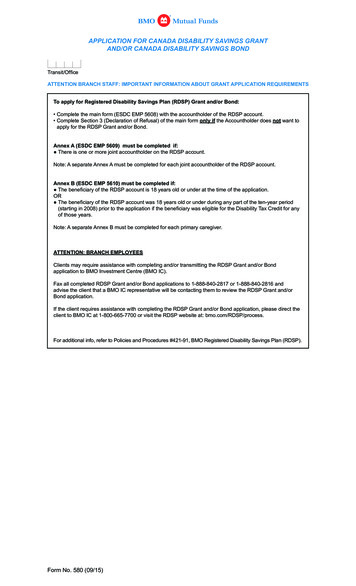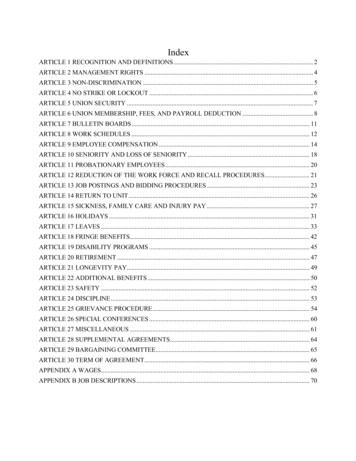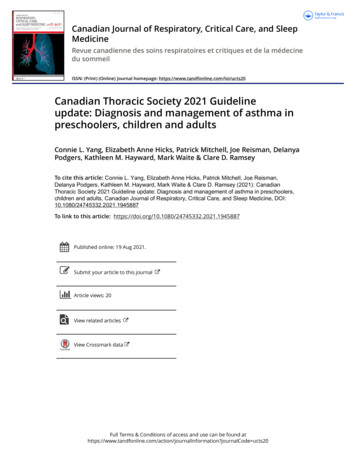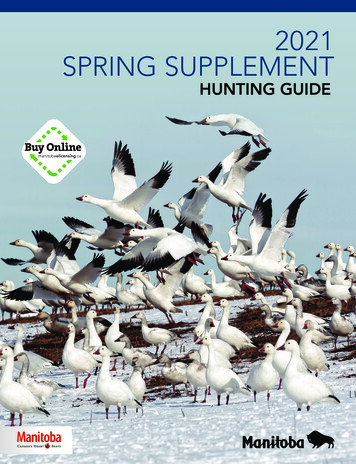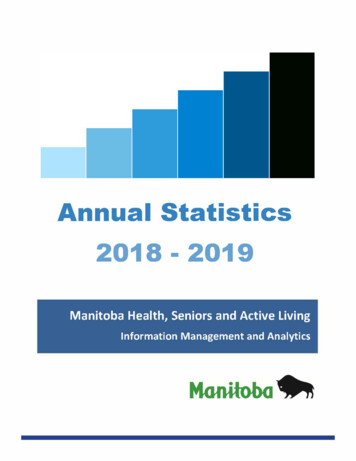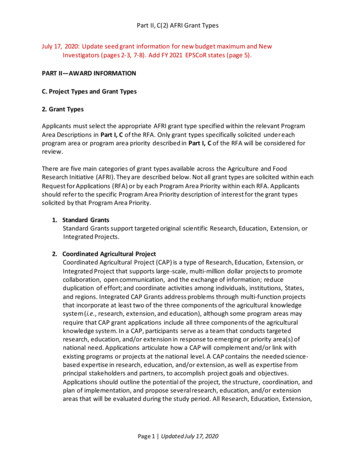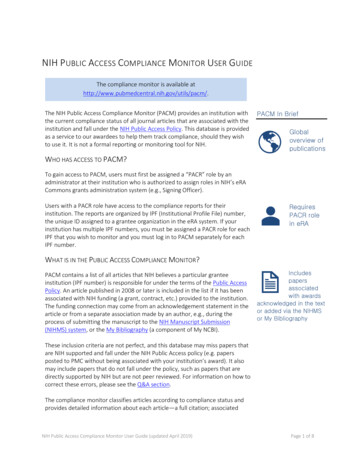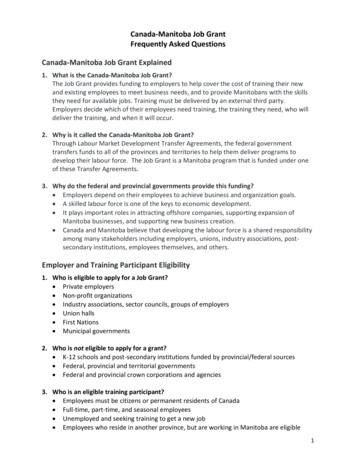
Transcription
Canada-Manitoba Job GrantFrequently Asked QuestionsCanada-Manitoba Job Grant Explained1. What is the Canada-Manitoba Job Grant?The Job Grant provides funding to employers to help cover the cost of training their newand existing employees to meet business needs, and to provide Manitobans with the skillsthey need for available jobs. Training must be delivered by an external third party.Employers decide which of their employees need training, the training they need, who willdeliver the training, and when it will occur.2. Why is it called the Canada-Manitoba Job Grant?Through Labour Market Development Transfer Agreements, the federal governmenttransfers funds to all of the provinces and territories to help them deliver programs todevelop their labour force. The Job Grant is a Manitoba program that is funded under oneof these Transfer Agreements.3. Why do the federal and provincial governments provide this funding? Employers depend on their employees to achieve business and organization goals. A skilled labour force is one of the keys to economic development. It plays important roles in attracting offshore companies, supporting expansion ofManitoba businesses, and supporting new business creation. Canada and Manitoba believe that developing the labour force is a shared responsibilityamong many stakeholders including employers, unions, industry associations, postsecondary institutions, employees themselves, and others.Employer and Training Participant Eligibility1. Who is eligible to apply for a Job Grant? Private employers Non-profit organizations Industry associations, sector councils, groups of employers Union halls First Nations Municipal governments2. Who is not eligible to apply for a grant? K-12 schools and post-secondary institutions funded by provincial/federal sources Federal, provincial and territorial governments Federal and provincial crown corporations and agencies3. Who is an eligible training participant? Employees must be citizens or permanent residents of Canada Full-time, part-time, and seasonal employees Unemployed and seeking training to get a new job Employees who reside in another province, but are working in Manitoba are eligible1
4. Who is not an eligible training participant? Individuals with a social insurance number that begins with “9” Temporary Foreign Workers Individuals hired on contract; i.e., non-employees Employees of a Manitoba company who reside and work in a different province orcountry5. Does a company have to be in business for a minimum length of time before applying forthe Job Grant? No, there is no minimum length of time required to be eligible. A company must have a Business Number issued by the Government of Canada andlicensed to carry on business in Manitoba6. Our company temporarily hires and pays interns to provide them with work experience.Can we include them as training participants in our Job Grant application?Yes.Funding Amount and Eligible Costs1. What is the amount of funding my company can apply for? Small companies with 100 or fewer employees can apply for up to 75% of eligibletraining costs. Companies with 101 or more employees can apply for up to 50% of eligible trainingcosts. Employers can apply for up to a maximum amount of 10,000 per training participant. Maximum Job Grant amount regardless of number of trainees and cost of training is 100,000.2. What costs are eligible for funding? Tuition fees or fees charged by an external training provider Mandatory student fees Textbooks, software and other required materials Examination fees3. Are travel costs to attend training eligible for funding? Travel costs are not usually eligible for funding. However, if training is not availablelocally or online, and training participants are located in northern or remotecommunities, employers may be eligible for reimbursement of a portion of requiredtravel and accommodations costs. The amount of travel and accommodations costs reimbursed is negotiated and is notguaranteed. Manitoba government rates are used to determine the eligible travel andaccommodations amount. The amount that an employer is reimbursed for travel and accommodations costscannot exceed the percentage at which all other eligible costs are reimbursed. Forexample, the maximum amount that a small company (100 or fewer employees) would2
be reimbursed is 75% of the total travel and accommodations costs; the maximumamount that companies with more than 100 employees would be reimbursed is 50% ofthe total travel and accommodations costs.The maximum Job Grant amount, including travel and accommodations costs, will notexceed 100,000.When submitting their Job Grant application, employers should indicate in their emailthat they wish to apply for travel costs and provide documentation that shows thetraining is either not available online and training participants must travel more than100 km to attend the training. A Consultant will contact them to determine travelexpense eligibility and provide travel expense guidelines.4. What costs are ineligible for funding? Expenses for internal training delivered by a company employee Wages of employees while in training5. Our company’s employees pay for their own training and once they pass, we reimbursethem for the training costs. Is the invoice provided by the training provider to theemployee eligible under the Job Grant if it is signed by the employer as being paid?In some cases, the answer is yes, and in others, the answer is no. For example, if anemployee is pursuing a college or university certificate/degree that is unrelated to theemployer’s skills requirements and business needs, tuition costs are ineligible. ContactIndustry Workforce Development to discuss this further.To be eligible for training costs initially paid for by an employee, employers must submitdocumentation showing the training cost is paid, and that the employee has beenreimbursed for the training cost.6. Can our company apply for a Job Grant for training that has already taken place?Employers can apply for the Job Grant for training that has already occurred as long as thetraining took place in the same fiscal year in which the application is submitted. The fiscalyear is April 1-March 31.Example: a company trained its employees in February and May, 2020 and applied for theJob Grant in June, 2020. The May, 2020 training is eligible for the Job Grant as it occurred inthe same fiscal year as the Job Grant application. The February training is not eligible as itoccurred in the prior fiscal year.7. Can our company include training in our Job Grant application that was paid for prior tothe start of the current fiscal year, but that is taking place in the current fiscal year?Yes8. Can our company include training in our Job Grant application that is paid for in this fiscalyear, but that is not taking place until the next fiscal year?No. The Job Grant application is for training that occurs in the current fiscal year.3
9. Is there any funding available for training delivered by a company employee? Forexample, training on proprietary processes and equipment?Employers can apply for funding for internally delivered training under the WorkforceDevelopment Program. Information on this program is located here:Province of Manitoba wd - Workforce Development (gov.mb.ca)Training Eligibility1. What training is eligible for funding? Training delivered by an external training provider; i.e., university, college or privatevocational institute, private consultant or company, industry association, sector council,union hall, etc. Training that an employer deems necessary to equip employees with new skills and/orknowledge to meet business goals; e.g., increased productivity, entry into new markets,increased sales, etc.Subsidiaries, Franchises and Companies with Multiple Locations1. Can a company with employees working at two or more locations in Manitoba includeemployees from all locations in one application?Yes2. Can a company that has one or more subsidiaries apply for a Job Grant to train employeesfrom several of its subsidiaries or do each of the subsidiaries have to apply for the JobGrant?A parent company can apply for the Job Grant to train employees working in Manitoba inone or more of its subsidiaries.3. ABC Company has 150 employees. XYZ Company, a subsidiary of ABC Company, has 65employees. Can XYZ Company be classified as a small employer?No, the subsidiary does not qualify as a small employer.4. Can an employer who owns a franchise of a national chain apply for the Job Grant as asmall company?Yes, if the franchise has 100 or fewer employees. A franchise owner is a separate companythat pays a franchise fee to the national chain in order to operate the company. Manyfranchise owners face the same challenges as a non-franchise small employer, and unlike asubsidiary of a larger company, cannot draw on the fiscal resources of the national chain.Companies with Employees Working and/or Living in Other Provinces1. If a Manitoba company employs workers who reside and work in Alberta, can it includetheir Alberta employees in their Manitoba Job Grant application?No. If the employees reside and work in Alberta, the company should contact the Albertagovernment for information on training funding availability.4
2. If a company employs individuals who work in Manitoba, but reside in another province,can it include these employees in their Job Grant application?Yes. If the employees’ permanent residence is in another country, however, they cannot beincluded in the application.3. If a company is located in another province or country, but employs individuals who workin Manitoba, can it apply for funding to train its Manitoba employees?If it is licensed to operate in Manitoba, and holds a Manitoba business number, thecompany can apply for Job Grant funding. Training participants must be employees of thecompany, and not contract workers.Job Grant Payment to Employers1. How and when does our company get actual payment of the Job Grant? Prior to payment:o Employers must submit the following: Training Plan Report Training Evaluation Proof of payment of eligible training costs (e.g., invoice and cancelled cheque;invoice and PayPal receipt, etc.) Upon successful review of these documents, Manitoba issues payment to the employer2. An employee who participated in training funded by the Job Grant left the company priorto the employer submitting its expenses for reimbursement. Can the employer includethe expenses for the employee who left and does the employer have to submit a PrivacyNotice and Consent Form for that employee? The expenses can be included, but a consent form is not required. If there is a fixed pricefor the training, regardless of the number of trainees, the fixed price should be dividedamongst all trainees (including the employee who left the company) to get a per/traineecost so that no trainee is penalized for a higher training cost because the price is dividedamongst fewer trainees. Employers should indicate on the training plan that the employee left the company priorto completing the training.5
Job Grant in June, 2020. The May, 2020 training is eligible for the Job Grant as it occurred in the same fiscal year as the Job Grant application. The February training is not eligible as it occurred in the prior fiscal year. 7. Can our company include training in our Job Grant application that was paid for prior to
